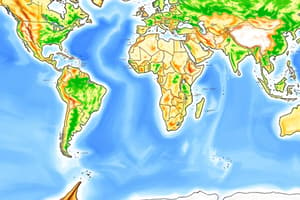Podcast
Questions and Answers
What is the main focus of Human Geography?
What is the main focus of Human Geography?
- The impact of human activities on the environment (correct)
- The study of geographic information systems
- The analysis of spatial distributions
- The natural environment and its processes
What is the term for the level of detail at which geographic phenomena are studied?
What is the term for the level of detail at which geographic phenomena are studied?
- Place
- Spatial Analysis
- Scale (correct)
- Region
What is the process of sediment and rocks being deposited in a new location?
What is the process of sediment and rocks being deposited in a new location?
- Plate Tectonics
- Erosion
- Deposition (correct)
- Weathering
What is the term for a specific location with unique cultural, social, and economic characteristics?
What is the term for a specific location with unique cultural, social, and economic characteristics?
What is the movement of the Earth's crust that results in the formation of mountains, volcanoes, and earthquakes?
What is the movement of the Earth's crust that results in the formation of mountains, volcanoes, and earthquakes?
What is the study of the relationships between geographic phenomena and their spatial distributions?
What is the study of the relationships between geographic phenomena and their spatial distributions?
What is the term for the removal of rocks and soil through natural forces such as wind, water, and ice?
What is the term for the removal of rocks and soil through natural forces such as wind, water, and ice?
What is the term for the increase in the number of people living in a particular area?
What is the term for the increase in the number of people living in a particular area?
What is the term for the movement of people from one place to another?
What is the term for the movement of people from one place to another?
What is the term for large bodies of saltwater that cover over 70% of the Earth's surface?
What is the term for large bodies of saltwater that cover over 70% of the Earth's surface?
Flashcards are hidden until you start studying
Study Notes
Branches of Geography
- Human Geography: studies the impact of human activities on the environment and the ways in which people interact with their surroundings
- Physical Geography: examines the natural environment and the processes that shape it
- Geographic Information Systems (GIS): uses spatial data and technology to analyze and understand geographic phenomena
Key Concepts
- Spatial Analysis: examines the relationships between geographic phenomena and their spatial distributions
- Place: a specific location with unique cultural, social, and economic characteristics
- Region: a larger area defined by cultural, economic, or physical characteristics
- Scale: the level of detail at which geographic phenomena are studied, ranging from local to global
Geographic Features
- Mountains: natural formations of land that are higher than the surrounding terrain
- Plateaus: elevated regions of land that are relatively flat
- Valleys: low areas of land between hills or mountains
- Oceans: large bodies of saltwater that cover over 70% of the Earth's surface
- Continents: large landmasses that are separated by oceans
Geographic Processes
- Weathering: the breakdown of rocks and landforms through natural forces such as wind, water, and ice
- Erosion: the removal of rocks and soil through natural forces such as wind, water, and ice
- Deposition: the process of sediment and rocks being deposited in a new location
- Plate Tectonics: the movement of the Earth's crust, resulting in the formation of mountains, volcanoes, and earthquakes
Human-Environment Interaction
- Population Growth: the increase in the number of people living in a particular area
- Urbanization: the movement of people from rural areas to cities
- Migration: the movement of people from one place to another
- Environmental Impact: the effects of human activities on the natural environment, such as deforestation, pollution, and climate change
Studying That Suits You
Use AI to generate personalized quizzes and flashcards to suit your learning preferences.




